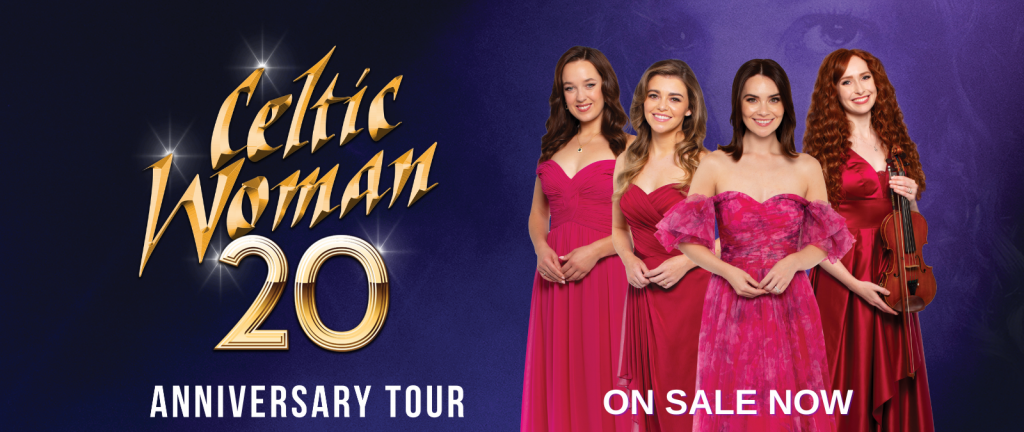By: Maggie Caroddo
On September 15, 2004, thousands of Irish music fans gathered at The Helix in Dublin. They had come to see five women who had never performed together before put on an intriguing spectacle. It would combine traditional Celtic tunes and modern songs and be so massively successfully that these artists – Chloë Agnew, Órla Fallon, Lisa Kelly, Méav Ní Mhaolchatha, and Máiréad Nesbitt – decided to stick together and create an ensemble: Celtic Woman.
Since that remarkable debut nearly 20 years ago, the group has sold over 10 million CDs and DVDs, cementing them as the only entirely female act this past decade to achieve multi-platinum success in the classical crossover and world music genres. Celtic Woman has also been named Billboard’s #1 World Music Artist of the Year six times and was nominated for a Grammy in the category of Best World Music Album for their 2016 album “Destiny.”
As of March 2024, the group is made up of Mairéad Carlin, Tara McNeill, Muirgen O’Mahony, and Emma Warren. While Celtic Woman no longer includes any of its original members, the group has retained its unmistakably Irish original sound. Their songs make skillful use of several traditional Celtic instruments, including bodhrán (a type of drum), tin whistle, bouzouki, and Uilleann pipes (bagpipes).
Beyond these dreamy instrumentals, the group’s Irish pride is palpable in their frequent use of the Irish language in their lyrics. Celtic Woman has released a handful entirely Irish songs since their debut album. One such ballad is “Dúlaman,” their take on a popular Irish folk song that pays homage to the Irish process of gathering seaweed, a food that was widely consumed during An Gorta Mór (“The Great Hunger”) in the mid-19th century. The group also has a wide array of songs featuring both Irish and English lyrics, such as “Téir Abhaile Riú,” “Mo Ghile Mear,” and “Harry’s Game.”
Although Irish language music very rarely gains attention outside of Ireland, Celtic Woman has embarked on several international tours across six continents and is currently performing on a 20th-anniversary tour across the United States and Canada. Given the history of the British colonization of Ireland and its attempts to erase the Irish language and culture, it is crucial to highlight artists who, like this band, proudly celebrate the nation’s rich traditions in their art. Whether you’re someone whose understanding of Irish culture is limited to St. Patrick’s Day and Guinness, or a member of the Irish diaspora who yearns to return to the motherland, give some Celtic Woman tunes a listen. I can guarantee that you will be auditorily whisked away to a quaint seaside village overlooking the Irish Sea, or to the bustling cobblestone streets of Galway.
